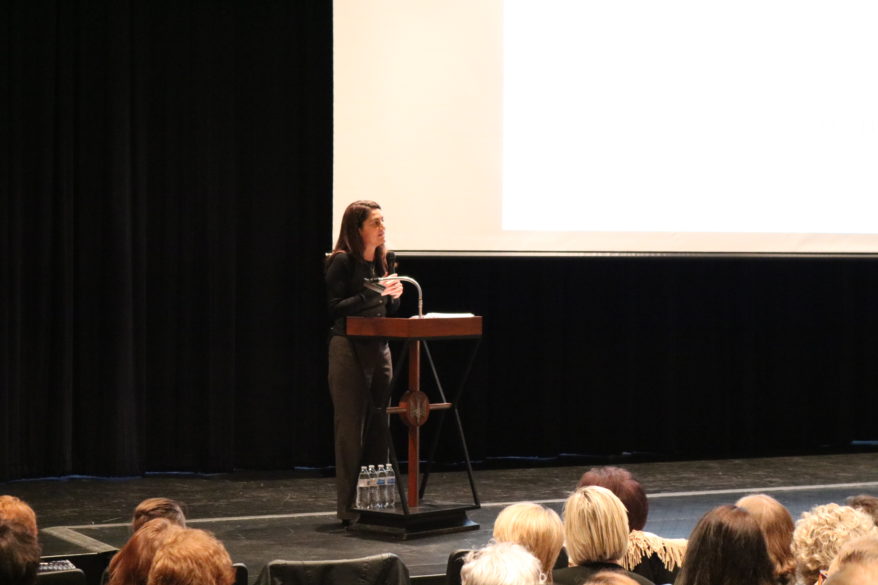By Maureen Smith
MADISON – “Prevention of sexual abuse is not a mindset, it is activity. You have to do something in order to prevent.” More than 500 educators and staff members of the Catholic Diocese of Jackson went home with this advice from a half-day workshop from child sexual abuse expert Monica Applewhite on Monday, Feb. 4. The Office of Child Protection offers an annual workshop for educators. This year’s event was held at Madison St. Joseph School and was open to chancery staff as well as teachers, staff and principals from the Catholic schools here.

Applewhite has spent more than 25 years in the field of abuse prevention and research. She is based out of Austin, Texas. She started the day by detailing the history of abuse awareness and prevention in the United States. She wanted the teachers to recognize that the study of sexual abuse and the laws meant to protect children and vulnerable adults from abuse are relatively recent in historical terms and so constant study and education are an important factors to make programs more effective.
One of Applewhite’s key points in the morning presentation is that the tough work of prevention is worth the effort. One success story she profiled was Big Brothers, Big Sisters. In the 1980s “Big Brothers discovered they had become a magnet for adults seeking sexual relationships with kids,” she explained. The organization’s leadership tackled the issue head-on, transforming their model to add screening, training and better supervision. “They decided that sometimes there is no substitute for the difference a relationship can make in the life of a child,” Applewhite said.
Applewhite gave a detailed presentation on different types of sexual offenders and how each of them operates within an organization and with an individual child or vulnerable adult. She discredited many stereotypes during this part of the presentation to make the point that abusers are not the shadowy strangers many think, but are often charming and involved in the community. Many spend a long time grooming both a victim and their families. This is how some abusers are able to maintain a relationship with their victims and keep them from reporting the crimes.
The afternoon presentation shifted to wholesome relationship development. “Wholesome relationship development involves compassion and empathy and independence,” she explained. Adults who want to involve other healthy people in a child’s life and who are emotionally consistent and transparent have a child’s best interests at heart. By contrast, grooming – that is “the process by which someone prepares a child and others in their environment for abuse,” is exclusive, secretive and isolating. Grooming often involves forbidden or sexually explicit conversations and boundary testing.
There is some overlap between the two relationships, said Applewhite. Teachers and youth leaders often do have close relationships with their students. This is where policies can help define appropriate behaviors, identify risky ones and keep everyone involved safe and accountable.
She urged the educators in her audience to step back from their personal relationships when they see a behavior that might be a sign of grooming or abuse. “We have to be open to things that are wrong or weird,” she said. “We have to be willing to say something, to confront the situation,” even if it involves a friend or colleague, she added.
Having standard policies may seem inflexible when young kids are involved, but they can help with gray areas. One example Applewhite used was an adult who wrestles with teens. It may be that the adult grew up in a family where rough-and-tumble behavior was the norm, but it also represents a boundary violation. A coworker or supervisor can issue a warning based on the standard policy that physical contact including wrestling is inappropriate. The warning details for the adult what structures are in place and it allows the supervisor to keep an eye out for further warning signs. It may seem like some rules are arbitrary ‘lines in the sand,’ but, “you have to set up that arbitrary line so you can act on it,” said Applewhite.
The last part of her presentation looked at peer-to-peer abuse. Applewhite spent some time discussing normal sexual behaviors in children, including curiosity about their bodies and trying out “potty words,” and then detailed behaviors that may be cause for concern and finally, problematic behaviors adults need to report and address. A majority of abuse perpetrated against very young children comes from other older children, she explained. Identifying and addressing early problem behaviors can protect the young children and save an older child from becoming an adult abuser.
Child Protection Coordinator Vickie Carollo saw Applewhite speak at a national conference and knew she wanted to invite her to the Diocese of Jackson. “I felt like her expertise and her wonderful way of presenting this tough information would be a perfect fit for our teachers and administrators,” said Carollo. “I went home with new information and I hope everyone who attended was encouraged and learned something new,” she added.
